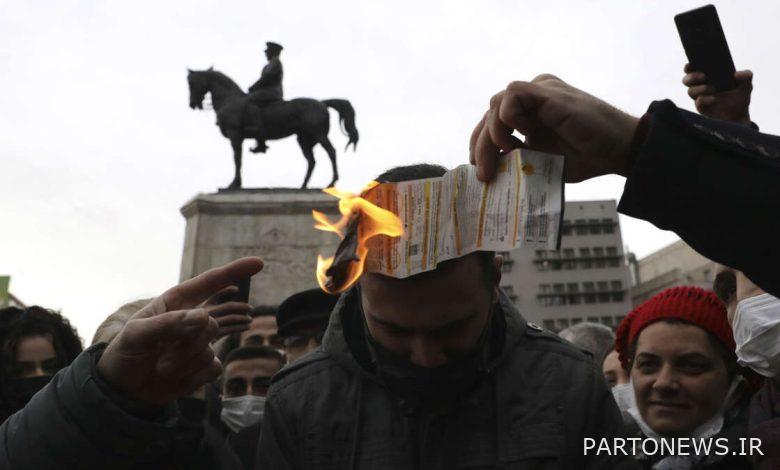Dizziness of small businesses and European households from rising energy costs

According to an Associated Press IRNA report on Saturday; In response to this situation, and at the same time with the unprecedented rise in inflation due to rising energy prices in their countries, European governments have rapidly approved financial assistance to reduce this pressure.
Nowhere in Europe is this pressure felt as much as in Turkey, where inflation has reached close to 50 percent, and figures on electricity bills have sparked protests and concerns about how small businesses can survive. In recent days, Turkish citizens have been posting figures on their electricity bills on social media to show how unacceptable the costs are. Store owners have also posted announcements complaining about the high cost of energy bills on the windows of their stores, and some have gathered in front of local power company buildings and set their bills on fire.
Electricity generation in European countries requires energy sources such as natural gas, the price of which has peaked and supply has fallen, while a significant drop in the value of the Turkish currency has pushed up the price of imported gas. Energy demand in Europe has returned rapidly from the depths of the Corona epidemic, in the face of declining gas reserves from last year’s cold winter, a shortage of renewable energy production in the summer and Russia’s refusal to supply normal gas to Europe.
Due to the increased costs imposed by water, electricity and gas companies on consumers and their customers, citizens are attacked twice, once by paying higher costs to households and once by increasing the costs of businesses. They themselves have to pay more for energy, which has led to a cost of living crisis in some countries. In Turkey, for example, where households and businesses have already experienced severe inflation and the loss of nearly 44% of the national currency value last year, the disappearance of savings has made it difficult to buy even basic goods such as food. Rising electricity tariffs in Turkey since January 1 have pushed up costs for some citizens by up to 50 percent and for high-consumption businesses and households by up to 127 percent.
Annual energy costs in the UK are also set to rise by 54% (close to ۰۰ 700 / $ 940) from April. However, the British government says that consumers will receive discounts on these costs so that they can repay them in small installments of several years, and most citizens will also receive discounts on local taxes.
Italian energy watchdogs say citizens need to prepare for a 55 percent increase in electricity prices and a 42 percent increase in gas prices in the coming weeks, as electricity prices rose in October. The Italian mayors dimmed the lights of the historic halls of Rome and Florence on Thursday night to draw everyone’s attention to the situation. The Italian Mayors’ Association has so far dismissed the government’s response to the protest as insufficient to help cities cope with hundreds of millions of dollars in additional energy costs, which have left them with two options: raising rates to balance budgets or cut services.
Polish regulators also approved a 37 percent increase in energy prices this year, shutting down bakeries and other businesses. The right-wing government has so far temporarily reduced taxes and duties on electricity, gas, car fuels, some foodstuffs and fertilizers, which are expected to reduce the annual energy cost of a family of four to about 26.5 euros. But these reductions only make up for part of the increase in costs, so the government has set an annual allowance of € 4.5 to € 320 based on household income. But businesses do not see these discounts as enough to offset the rising costs and expenses of their revenue.
According to the Associated Press, “Eurostat” announced on February 4 that the rise in inflation in the Eurozone “Eurozone” due to high energy prices to unprecedented levels for the third consecutive month, caused problems for consumers and questions about future decisions. The European Central Bank. The annual growth of consumer prices in the 19 countries using the euro currency reached 5.1 percent in January, up from 5 percent in December and 4.9 percent in November, according to Eurostat. This is the highest rate since the statistics were first recorded in 1997.
Natural gas prices due to declining winter reserves in European countries and declining natural gas supplies by Russia and concerns about a possible military conflict between Russia and Ukraine and global crude oil prices at the same time as the global economy improves and the gradual exit from the recession caused by severe restrictions Quarantine to curb Covid-19 increased by 28.6%.
Eurostat figures show that eurozone economic growth slowed to 0.3 percent in the final quarter of 2021 following the Omicron epidemic and the re-imposition of quarantine regulations.
Financial market analysts predict that inflation will decline significantly this year, reaching 1.8 percent in 2023 and 2034.
The price of oil reached its highest level again, approaching its record last week, which was unprecedented in the last seven years, Reuters reported on Wednesday. The increase was due to high demand and supply shortages, although investors remain cautious ahead of today’s OPEC Plus meeting. Global supply constraints and geopolitical tensions in Eastern Europe and the Middle East have pushed oil prices up about 15 percent since the beginning of 2022.

